Ted Passon: „Patrice: The Movie“ – A Love Story Changing Politics
| Tina Thiele, Ausarbeitung Daniela Deffner, Layout Carla Schmitt
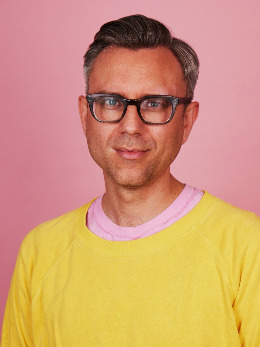
„Patrice: The Movie“, directed and co-produced by Ted Passon, was the first film to receive the newly established „all inclusive Award“ at DOK.fest Munich, the world’s first honor of its kind, and it is now nominated for an Emmy.
The documentary tells the powerful story of Patrice Jetter and Garry Wickham, who are fighting relentlessly for their rights and love. Without giving too much away: if they were to marry, they would lose access to the healthcare program that provides the medication they rely on to survive.
After the film was released President Joe Biden invited the remarkable, loving couple to the White House in 2024 to help challenge this paradoxical law. This summer, Patrice and Garry returned to Washington, this time to advocate not only for their own future but for the very existence of the healthcare program itself.
In this interview, we speak with director Ted Passon about the making of the film, its political resonance, the history of disability rights in the United States, and the challenges faced during production.
The film is Emmy nominated and when can we expect to see „Patrice: The Movie“ in Europe or specifically in Germany?
We don't have a date for Germany, but international sales agents called „Outlook Films“ is working on it. If people want to help them, they send an e-mail to welcome@autlookfilms.com and let them know that they're excited for the film to come to Germany. The more of those emails they get, the more they can show to other distributors that there's an audience for this.
Without giving too much away, can you tell us something about Patrice and Garry's trip to Washington, which for me is a central image of the film? How do you assess the current political situation and the impact of cuts to diversity programs on people's daily lives?
When we originally made the film, we were really focused on changing the laws in the US around marriage equality for the disabled. And we started off in a really good place. The film came out and less than 24 hours later, to our surprise, the Social Security Administration, the government office which manages benefits for disabled people, put out a statement on the film which basically said: “Hey, we get it. We get that we have outdated rules that need to change. We'd like to remind everybody that we don't make the rules, Congress does. We just enforce them. However, we stand ready to help Congress make those changes.” For us that felt like a really big deal. And that came the day before Patrice was featured on a very popular morning interview show in the US, where we were able to talk in front of a big national audience. After that she ended up on a bunch of other big TV shows, which was very exciting because there was just no discussion about it before!
Through a series of events, Patrice was invited to the White House to meet with President Biden and who gave Patrice time to speak about disabled marriage equality. President Biden was on television that day, and he mentioned Patrice and her view on the topic. We couldn't believe how fast this was all happening! Remember: this was not even two months after the film came out. So it felt like we could actually bring about a change in the law. But then the presidential election happened and after Donald Trump won it was all gone, all our work and the efforts we had already made were gone. From then on, our focus shifted from marriage equality to maintaining the status quo, particularly with regard to basic health care for people with disabilities. Unfortunately, we were unsuccessful. They cut the healthcare program, Medicaid, that Patrice and Garry and a lot of disabled people in the US rely on by $ 1 trillion. And so it is likely that in the next few years, 14 million disabled and low-income people - some estimates say 14 million, others 17 million - will lose their health care. Our work now is making sure that people don't forget who did that to them, because due to the structure of the cuts, they will not be implemented immediately. We want to make sure that all the lawmakers who voted for this bill are going to be remembered for it. They voted for this just to find money to give tax breaks to billionaires and millionaires. That's it.
So it's been hard. But we were just in Washington DC two weeks ago at an event that they called the „Vigil for Medicaid“, which was kind of like the funeral for the Medicaid program. At one point, Patrice, Garry and myself and some other disabled activists went around to different members of Congress and thanked the ones that voted against the cuts and then yelled at the ones who voted for the cuts. We're just continuing with what we were doing, alongside a lot of organizations and try to stay positive.
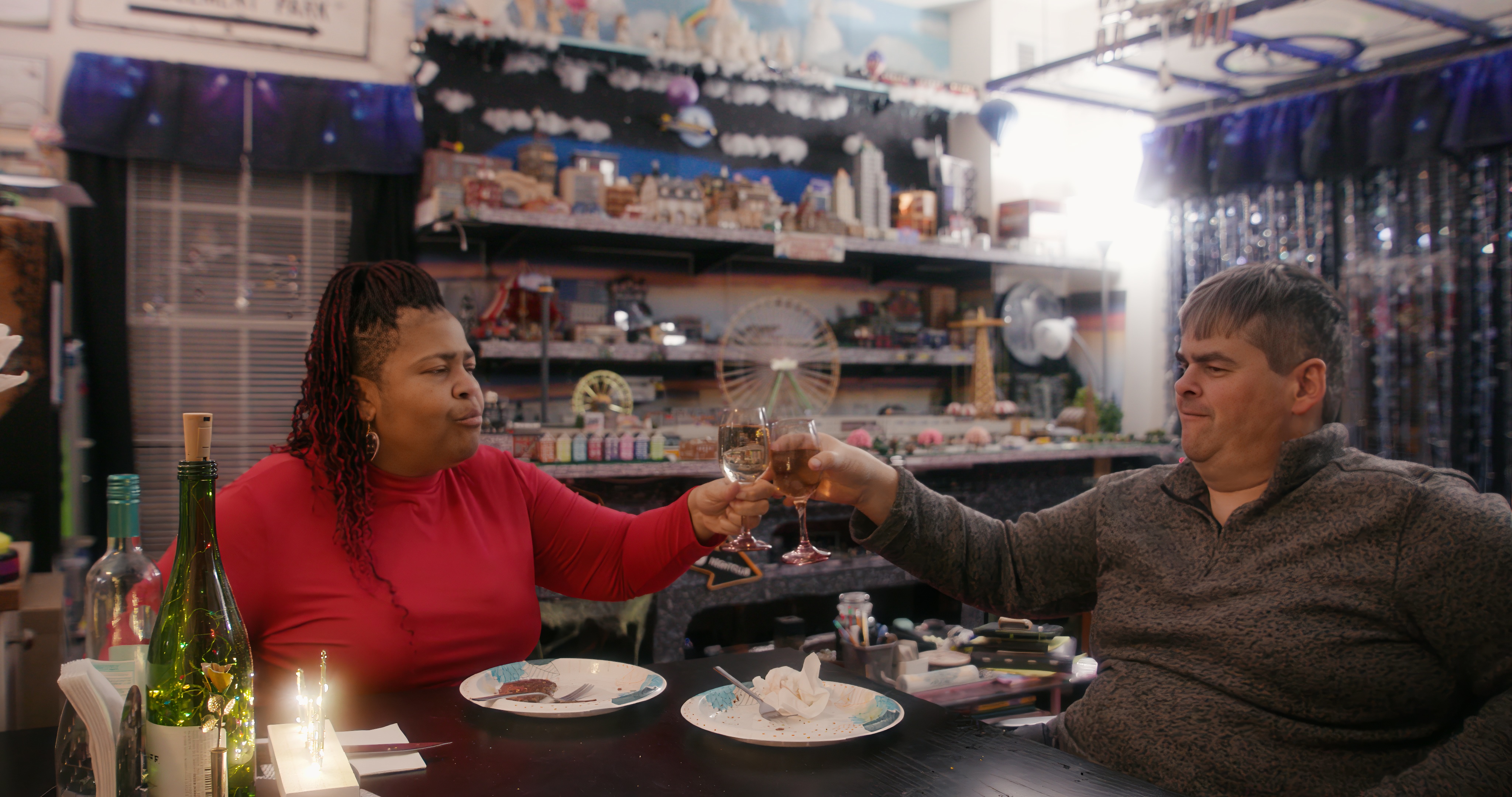 |
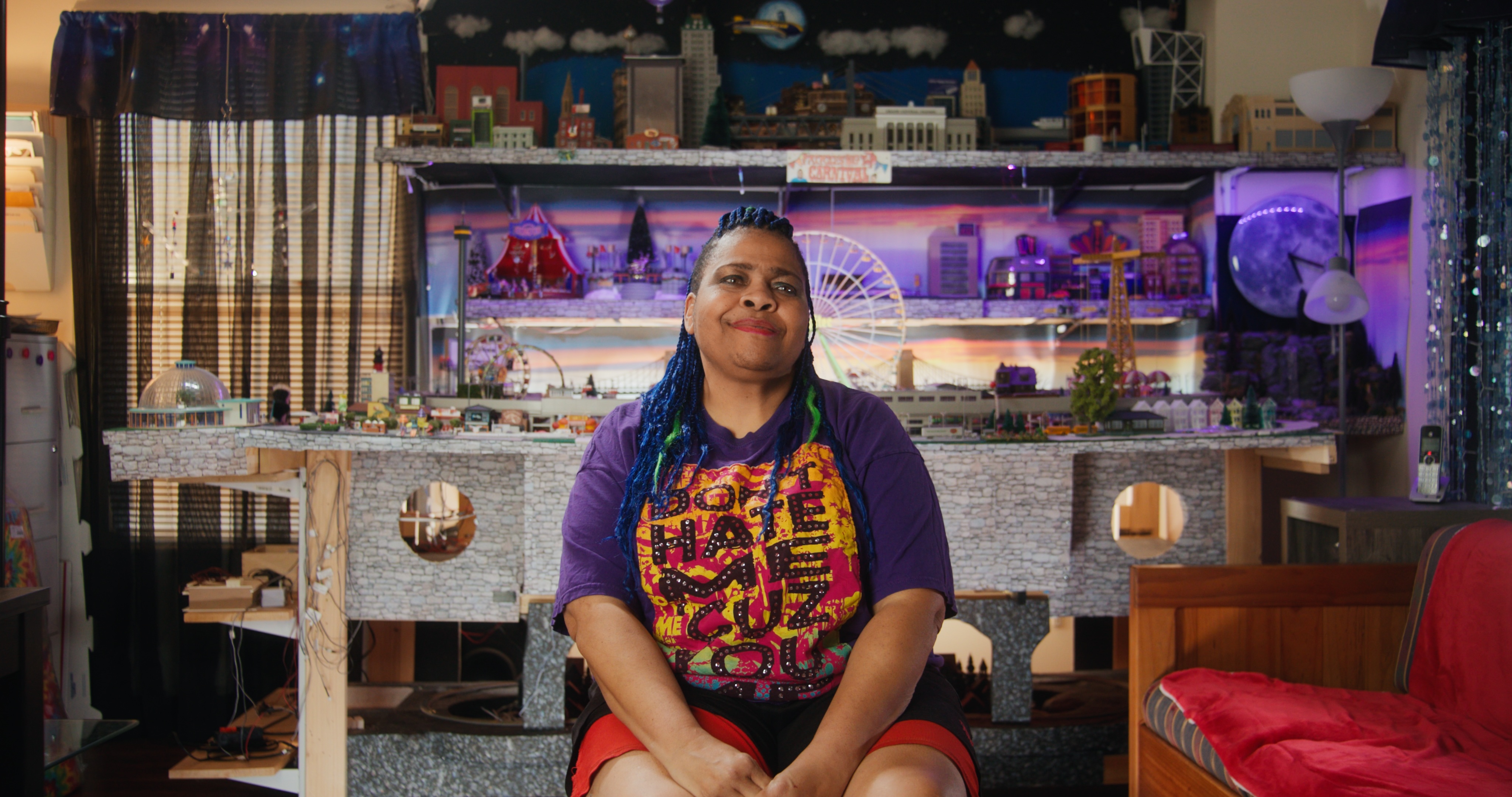 |
| Patrice and Gary Dinner | Patrice PTown |
How does it feel for you and your team to have received the first „all inclusive Award“ at the DOK.fest Munich?
It was a huge honor for all of us. We were very excited and very surprised, very pleasantly surprised! It’s such an important award because the work of disabled artists is always undervalued and disabled stories are often left invisible. To have an award that's meant to shed light on both of those is incredibly important. And we really hope that the award is something that influences festivals and distributors around the world to start to take notice of teams that have disabled film makers in them or are even led by disabled film makers. The new award category is absolutely smart and we're just really honored to be to be the first ever recipients of it. It really means the world.
What was your personal motivation to tell Patrice and Garry's story? Was there a key moment that inspired you to make this film?
I've known Patrice for well over 20 years, we met through her niece who is a well-known singer-songwriter in the United States named Kimya Dawson. The first music video I ever made was for Kimya. She would come to town when she was on tour at least 3 or 4 times a year and we would always see each other. Patrice would always come and hang out too. And from the first moment I met her I thought: Oh my God, who is this? She is amazing! So I always had it in the back of my head to do something with her. I was never sure what it was, but it just always felt like it would be fun to do some sort of project with her. She's such a great artist. But it wasn't until just a few years ago that I had the time and the bandwidth to talk to her about it. So, we connected with one of the producers of the film, Emily Spivack, and brainstormed some ideas. This was going back and forth over a couple of weeks and Garry proposed right during that time. This was a big event in Patrice’s life so it seemed worth following. And as soon as we learned that they would lose their benefits if they got married, we knew that this was our main focus. This was bigger than the two of them. So we just started filming from there.
The film emphasizes inclusivity, both in front, off and behind the camera. How did the collaborative process work within such a diverse team?
It really started with our producer Kyla Harris, who's a brilliant disabled filmmaker. She really kind of set the tone and talked with us at length about the difference between the medical model of disability and the social model of disabilities. She was constantky teaching our team about disability politics and disability rights.
I grew up with a father who was disabled, but I still didn't know anything. Just because you have proximity to disability doesn't necessarily mean that you know anything about the depth of their struggles. So as we went along, we made sure that we were raising money for the film. We were able to bring in disabled people at different tiers of production, part of the production team, part of the post production team. And we always made sure that different voices of people with disabilities were represented in the room during all discussions about the project. Of course, Patrice and Garry were big contributors to the film. We had lots of conversations about what was important to them, what made sense to them, what parts of their lives they thought people needed to see. We just tried repeatedly until we figured out what felt the best. Thankfully we had a wonderful team and the collaboration at the end of the day was easy, all things considered.
What were the biggest challenges, not only physically, maybe also psychology? Most rewarding moments during production, especially concerning ability and inclusion?
I would say there's two parts to that. We often joked on the team that disability is like in the „Matrix” where you take a pill and suddenly you just see all the lack of access everywhere. It's like a new way to see the world. We ended up working with an accessibility coordination team of people who are all disabled themselves and who specialized in working with film shoots. They came and helped us with the more complicated things that we were shooting to just make sure that things were accessible . They were also instrumental in setting the scenes and helped us, for example, in selecting an accessible filming locations. And they kind of kept track on making sure that nothing was being forgotten, nothing was falling through the cracks. One nice thing about working with the accessibility team was that they're not just for the disabled people but wanted to make everybody's work life better. They gave out anonymous surveys to everybody on the crew that had to be filled out in private. So they knew the points that could make the crew's work easier, but which they perhaps didn't dare to tell us about. That was such a different atmosphere, normally nobody's asking what you need, everybody is in a hurry because time is money. This was definitely a different way of working. I think everybody had a good time while shooting and a big part of that atmosphere was that accessibility.
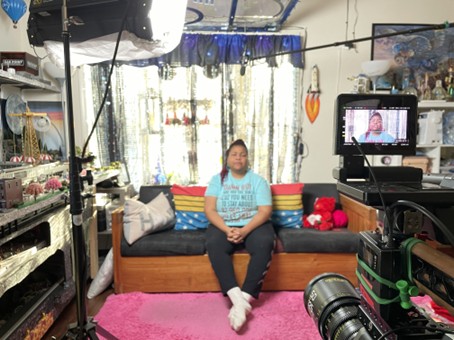 |
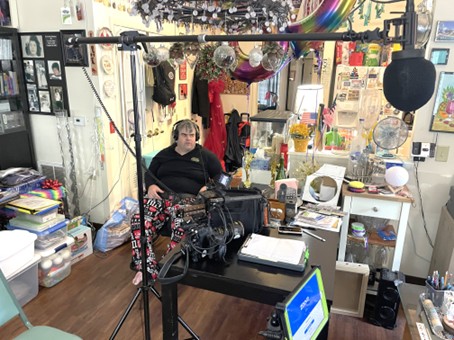 |
So how do you hope „Patrice: The Movie“ will influence public conversations about disability rights and social justice in the USA and internationally?
There are so many things I hope people take from the film. I hope they realize how restrictive and outdated our system in the US is. So many disabled people are forced to live below the poverty level just to pay their medical bills. I hope that people start to see how absurd it is that it prevents people from getting married, from being with their loved ones.
On a bigger picture, I hope that people understand how much disability as an issue and as a human condition is simply not taken into account in so many areas of society. They're simply not thought about, not included. Even in places where diversity, equity and inclusion are thought of a lot, I think disabled people are still often left out of the conversation. So I hope the film brings more awareness to the day-to-day struggles of disabled people in the US. Struggles that are unnecessary and preventable.
The film has a really important subtext about interdependence, which I think is a really important lesson that the disabled community must teach the non-disabled community. The importance of interdependence, of relying on each other, of helping each other. That's not a weakness, it’s a strength. The idea that you don't need help is absurd! Yes, you do. Everyone needs help. You don't get anything in this life without help. We have this capitalist mentality that makes us feel like we have to do everything on our own, or at least makes us believe that we do, even if it's not true.
The jury praised the film’s „sensitivity of a fine pencil“. How did you balance political issues with personal stories and emotions in your storytelling?
Patrice and Garry made it easy for me because they are so naturally joyful and fun. It was a very conscious effort to make sure that our storytelling was not just sad storytelling, which I think is a mistake both dramatically and in terms of content. It can be a trope of stories about disabled people we didn’t want to fall into. I think it's also not true to life. There is almost no situation where human beings are together and humor and joy won't find a way, even when going through a hard time. Because that's how we survive hard times: by finding those little joyful moments here and there. In order to do justice to humanity, you must therefore also include these moments.
I also think that when something is sad all the time, it actually betrays the real emotional intensity of that situation, because it numbs the audience out. It's as if they don't really understand how difficult something actually is unless they are shown a contrast. The audience has to embark on a journey to recognize change. To achieve this, it was a conscious decision to present things in a funny or witty way. In any case, it was important to use emotions other than sadness or darkness so that certain important moments really stood out. And that was a long process of trial and error. There was a lot of editing and even re-editing.
We wanted to create something that was completely in line with Patrice's aesthetic and artistic vision. What we particularly liked about it was that we could really play with the emotional intensity of the various themes, especially in the scene with the children. This allowed us to talk about something dark, but in a slightly more humorous or cute way. The children were really special because, in a way, they also allowed us to do the exact opposite: we were able to make certain points even darker, because when you juxtapose the innocence of a child with the inhumanity of a system, the inhumanity becomes much more obvious.
You’ve previously worked on projects like „Philly DA“. What lessons from those experiences influenced your work on „Patrice: The Movie“?
A really good lesson I got on „Philly DA“ was just filming and being present as much as possible. We had around 563 days of shooting for that project, which was ridiculous but it taught me the value of showing up over and over because people get comfortable with the camera. They act more natural and it's easier to chart what's happening in someone's life. The more you're there, the more you figure out what's really important in someone's life, things you thought were completely unimportant or actually very important. For instance, when Patrice was driving my car and it started making these funny noises and she's like: I have to take it in. That's something that I didn't think very much of at the time and it became a central part of the story. You just never know what you're going to get.
How did working with producer Kyla Harris and other team members with a disability experience shape the final film?
She was a wonderful collaborator, partner and team member. Kyla was really the guiding light for us in many ways. She came to us with so many ideas and so much lived experience, so much expertise. Like I said before: she really kind of changed how we were looking at the world. We wouldn't have been able to tell this story without that happening. We wouldn't have been able to understand or see this story without her guidance and her insight and as well as all the other disabled people on the team.
In Germany, there is still often a medical model view of disability. How does that compare to the perspective in the U.S.?
We have a remarkable history of disabled activism in this country for sure in the US. One of the developments that took place during Patrice's lifetime is that when she was growing up, it was common practice to simply place people with disabilities in institutions. They had no rights, no autonomy. If you were disabled, it was almost impossible for you to go to a regular school, which meant that you were probably not going to get a job. But there's a lot of disabled activists who really took on that cause. Judy Huemann is considered the mother of modern disabled activism in the US. She and many other activists fought hard in the 1970s, 1980s, and 1990s and finally achieved a change in the law so that people were released from these institutions, reintegrated into society, and every government and every institution that received state funding had to be accessible. That changed a lot of the landscape, a lot of the buildings. There's still a lot more to do, but it's nice that we have had this history. However, I would say that the medical model is still the dominant view in the United States. „Crip Camp“ and „Coda“ (Casting: Deborah Aquila, Tricia Wood, Lisa Zagoria) have raised awareness to some extent. Reid Davenport's films have certainly done so as well. Slowly but surely, these issues are becoming more popular in this course, and there is a more stable representation in television and films.
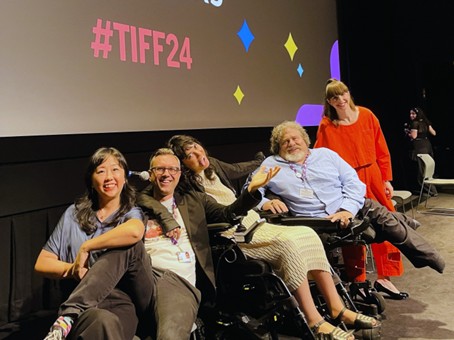 |
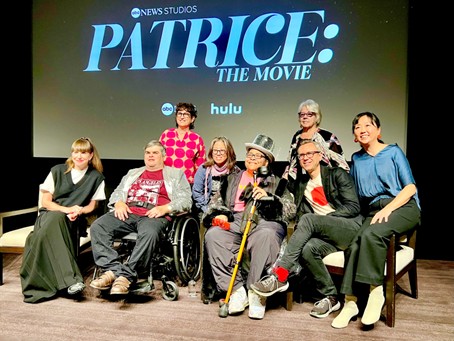 |
Are there future projects planned that will continue to focus on inclusion or other forms of diversity in filmmaking?
I'm currently working on a project, not as a director, but as an executive producer. It's about a character with a disability and someone who is terminally ill. It's about what it's like to be disabled, but also about being constantly confronted with death. And about how people look at you, how they treat you, and what opportunities you have. So this project focuses on what it's like to look at life from that perspective.
Thank you for the interview, and keeping our fingers crossed for the Emmy!
www.tedpasson.com
-----------------------------------------------------------------------------------------------------------------------------------------------------------------------
About the Award
The all inclusive Award was presented for the first time in 2025 and carries a prize of € 5,000. It honors documentaries in which filmmakers with disabilities play a leading role and where an inclusive team was involved in the production. The award was funded by the Werksviertel-Mitte Foundation.
The jury of the „all inclusive Award“ 2025 at DOK.fest Munich consisted of three experts committed to increasing visibility and participation of people with disabilities in the film industry:
Seneit Debese: Founder and CEO of Greta & Starks Apps GmbH. With her award-winning app GRETA, she enables barrier-free cinema access for people with sensory impairments, older audiences, and non-native speakers in 14 countries.
Olaf Jacobs: Producer at Hoferichter & Jacobs Film- und Fernsehproduktionsgesellschaft. He produces journalistic primetime programs for German public broadcasters and is managing director of the Filmförderung Mecklenburg-Vorpommern.
Tina Thiele: Owner and publisher of Casting-Network. She is an expert in inclusion in film and initiated the „Cast Me In” initiative in 2022, which promotes diversity and equal opportunities in film casting.
Further information about the jury and the award can be found on the official DOK.fest Munich website.
-----------------------------------------------------------------------------------------------------------------------------------------------------------------------
About the Emmy Nomination
„Patrice: The Movie” has been nominated for the 77th Primetime Emmy Awards 2025 in the category „Exceptional Merit in Documentary Filmmaking”. This award recognizes outstanding achievement in the field of documentary filmmaking. The nomination of „Patrice: The Movie” highlights the importance of inclusive storytelling and the recognition of documentaries that address social issues.
In this category „Patrice: The Movie” competes with other high-profile productions such as „I Am: Celine Dion” and „The Remarkable Life of Ibelin” (Television Academy).
The winners will be announced on September 14, 2025, during the Emmy Awards ceremony, which will be broadcast live from the Peacock Theatre in Los Angeles (New York Post).
„Patrice: The Movie” is currently available on Hulu.
-----------------------------------------------------------------------------------------------------------------------------------------------------------------------
Zur weiteren Vertiefung des Themas ein Beitrag in der ARD-Audiothek
USA: Diskriminierung per Gesetz - Wie behinderte Menschen um ihre Rechte fürchten